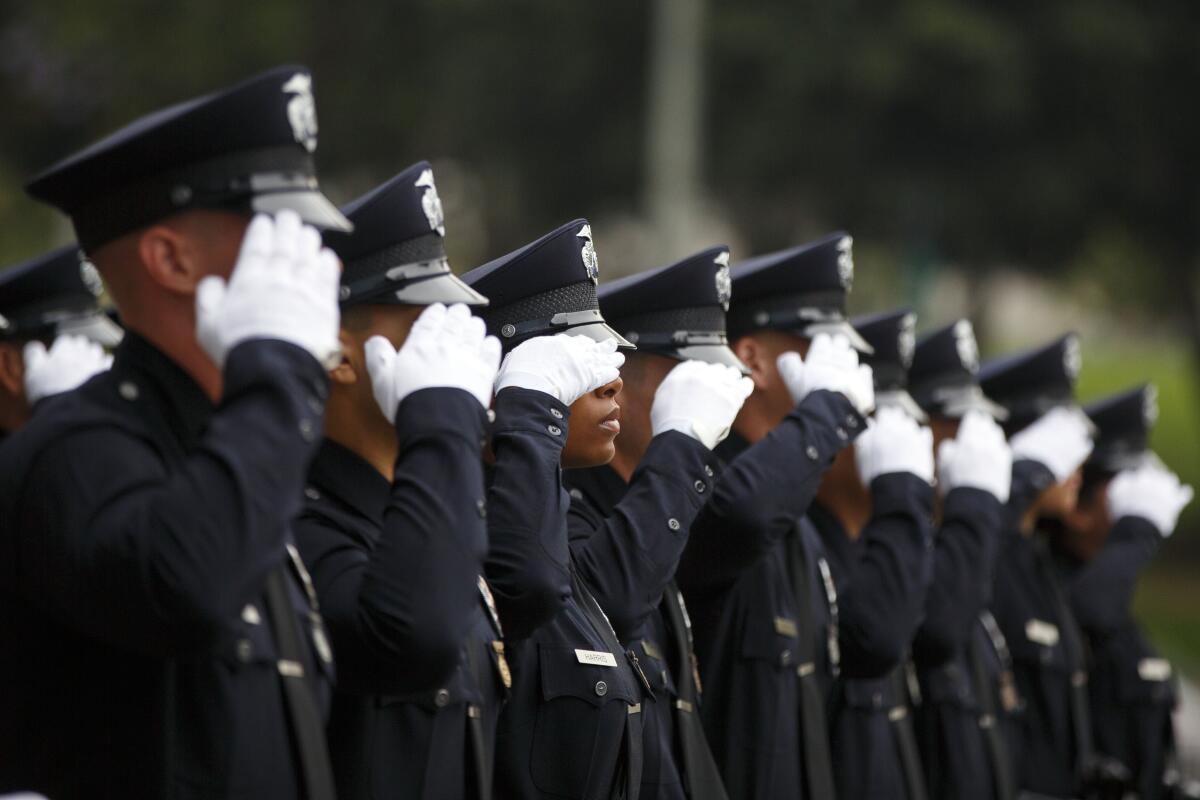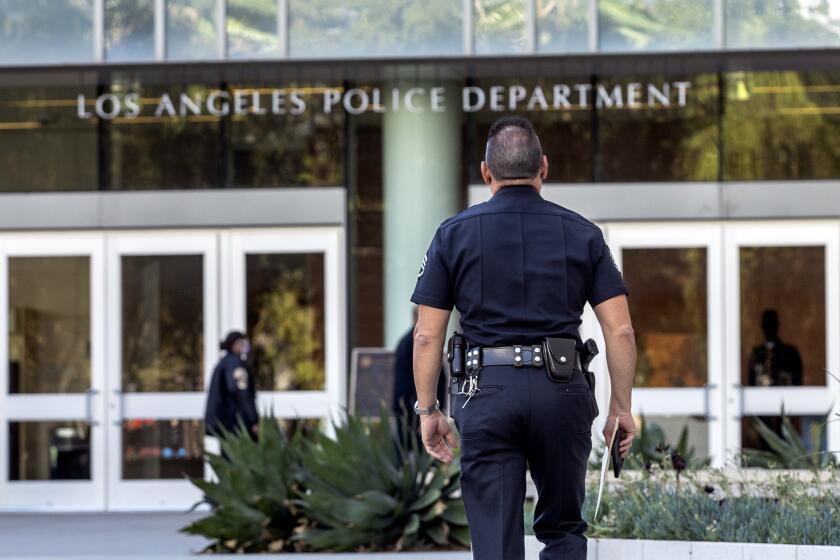Judge says ‘prior restraint’ to remove published photos of LAPD officers is justified

- Share via
In a rare decision handed down this week, a California judge found that the city of Los Angeles could justifiably censor the free speech of an activist group by forcing it to stop publishing pictures of LAPD officers online.
The ruling is the latest twist — but not the last word — in a legal battle between the city and the local journalist who obtained the photos by filing a public records request and the Stop LAPD Spying Coalition, which published the images on a website called WatchtheWatchers.net in March.
L.A. Superior Court Judge Anthony Mohr wrote in his decision Wednesday that while such “prior restraint” on the speech of a political group is allowed only under “extraordinary” circumstances, it was warranted because Stop LAPD’s publication of the photos threatened the safety of officers working undercover.
“Courts have recognized, and rightfully so, the interest — indeed, the necessity — to protect people who work in that capacity,” Mohr wrote. “To shield them promotes safety to both the individual officers and to the public.”
Mohr’s ruling denied a motion brought by Knock LA photojournalist Ben Camacho and Stop LAPD Spying to have the city’s lawsuit against them dismissed. It was based only on a preliminary review of arguments in the case, in which the city is seeking to take down the website and claw back the photos. It is not the final ruling on whether the city will be allowed to impose the censorship it seeks.
Still, such a decision in favor of prior restraint is rare and worrisome, media advocates said. Attorneys for Stop LAPD Spying and Camacho said they plan to appeal.
Media organizations including the Los Angeles Times are supporting a local journalist being sued by L.A. for publishing photographs of LAPD officers.
Mohr, an appointee of former Gov. Pete Wilson, still hears some matters in court despite being retired, as part of a California program to assist sitting judges with heavy caseloads.
The city attorney’s office and LAPD did not respond to requests for comment Friday.
Shakeer Rahman, an attorney for Stop LAPD Spying, called Mohr’s decision “baffling” and “a wrong interpretation of the 1st Amendment.”
Rahman said courts almost always reject efforts at prior restraint, “even when the government is claiming severe threat to national security or when an individual’s constitutional rights to a fair trial are implicated — and there’s none of that going on here.”
Instead, he said, the city itself gave Camacho the images. Camacho then gave the digital files to Stop LAPD Spying and made them available online, where they have since spread to a much wider audience, Rahman said.
“The 1st Amendment clearly protects the public’s ability to publish information that’s available in the public domain, and to publish public records,” he said.
Hamid Khan, lead coordinator of Stop LAPD Spying, said he and his group “completely reject the judge’s decision.”
“WatchtheWatchers.net belongs to the people of Los Angeles because it is providing information about public employees,” Khan said. “This is clearly an issue of silencing our 1st Amendment right to collectively share this information.”
Rahman and Khan both said the city’s effort to claw back the photos is part of a broader effort to block transparency around the Los Angeles Police Department, one of the city’s most powerful institutions and one deserving of scrutiny.
“We completely reject this whole notion of secret police,” Khan said. “That is unacceptable and we will continue to fight this.”
The city has tried to contain fallout from the release of the photographs ever since it says it realized there were pictures of undercover officers among them. Attorneys for Camacho say the city still has not proved that claim.
Hundreds of officers prepared to sue the city over the release of the images, and the officers’ union has criticized their release as a massive failure. In addition to suing for their return, City Atty. Hydee Feldstein Soto began lobbying California lawmakers to weaken the state’s public records law to allow government agencies to decline future public records requests that seek “images or data that may personally identify” employees.
Several hundred Los Angeles police officers who worked in sensitive assignments on Tuesday filed a government claim against the city for allegedly endangering their lives by releasing their photographs.
A coalition of media organizations, including the Los Angeles Times, has denounced the city’s efforts as a dangerous attack on press freedoms. Media and constitutional scholars have said the city’s arguments clearly call for an unconstitutional prior restraint on information that is already in the public domain and cannot possibly be withdrawn.
In his decision, Mohr split his analysis of the issues into two parts — one as they relate to Camacho, and another as they relate to Stop LAPD Spying.
Mohr acknowledged Camacho’s actions were related to a matter of public interest and “arose from newsgathering.”
Nonetheless, he found that Camacho agreed not to receive photos of undercover officers during an earlier court battle. Camacho essentially violated that “contract,” the judge wrote, by refusing to return a flash drive that the city had provided to him after the city realized such images had inadvertently been included.
Mohr wrote that the city’s demand that the flash drive be returned would not amount to prior restraint because the drive is the city’s “property” and “the First Amendment does not bar the plaintiff from retrieving it.”
Susan Seager, an attorney for Camacho, said if anyone violated a contract, it was the city — which itself provided the images. She called the claim that the flash drive is just “property” and therefore doesn’t implicate Camacho’s 1st Amendment rights simplistic.
“The idea that it’s not prior restraint because a bunch of information is contained in a flash drive ignores the 1st Amendment protection of information,” she said.
Mohr’s analysis as to Stop LAPD Spying was different.
He agreed with the group’s claim that the city’s complaint against it “arises from publishing information derived from public records in order to increase police accountability,” and that its actions amount to “protected political speech.”
However, the group’s right to publish material had to be weighed against the city’s “compelling interest” in protecting the competing privacy rights of the officers, he said.
There are “occasions where an officer’s work and duties require anonymity,” and the city “has identified such a situation — protection of officers who operate undercover,” Mohr wrote. “Case law confirms that in those limited circumstances, the government interest in preserving that anonymity justifies withholding information for public distribution.”
More to Read
Sign up for Essential California
The most important California stories and recommendations in your inbox every morning.
You may occasionally receive promotional content from the Los Angeles Times.
















